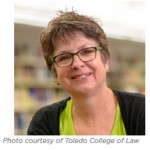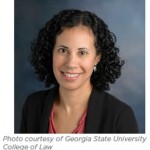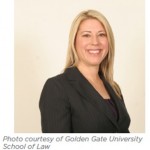Spotlight on Sections: Section on Constitutional Law
By Melinda Price
AALS Sections provide a forum for law school faculty and staff to connect on issues of shared interest. There are currently 100 AALS sections, each focused on a different academic discipline, affinity group, or administrative area. For a full list of AALS sections and how to join, please visit www.aals.org/services/sections.
For this edition of “Spotlight on Sections,” AALS spoke with the leadership of the Section on Constitutional Law about their programing at the 2016 AALS Annual Meeting and other section activities.

Rebecca E. Zietlow, University of Toledo College of Law (Chair-elect)

Lauren Sudeall Lucas, Georgia State University College of Law (Chair)

Laura A. Cisneros, Golden Gate University School of Law (Executive Committee, Chair 2015-16)
Laura A. Cisneros: In conceiving the idea for the On Resistance and Recognition panel, the goal was to respond to the increasing interdisciplinary work currently being done in constitutional law. The field lends itself to interdisciplinary interventions from philosophy, literature, sociology, history, and political theory, to name just a few, so the idea of a broader theme seemed to appeal to this interest.
We aimed to build the panel around concepts that were narrow enough to speak directly to issues arising under the U.S. Constitution but at the same time broad enough to accommodate presentations across a range. Conversations with colleagues helped to crystallize the conceptual pillars of “resistance and recognition” as fitting to create a space where we could, as a field, intervene in the overall issue of resisting oppressive (however defined) government policy and regulation, and asserting rights for recognition under the U.S. Constitution. Thanks to an amazing panel we were able to facilitate an opportunity to engage in and think about issues of constitutional law from a historical, doctrinal, political theory, sociological, and practical perspective.
Rebecca Zietlow: The section has been trying to bring in different perspectives on constitutional law, not just what the U.S. Supreme Court says or appears to say, but highlighting the increasingly interdisciplinary work being done in the field.
At the time Professor Cisneros was organizing this, the Black Lives Matter demonstrations were another inspiration for the panel. The idea was to talk about the U.S. Constitution, but be broad enough to accommodate other participation. For example, Rachel Moran (University of California, Los Angeles School of Law) discussed a project that she’s working on how the law affects Latinos, and does or does not serve their needs.
Lauren Sudeall Lucas: [Professor Moran] co-presented with Professor Robert Nelson, with whom she has been working through the American Bar Foundation, and they engaged the audience in a very interesting discussion about changing demographics. Through their work, they are thinking about how groups might resist, in Laura’s words, repressive government policy and seeking recognition for groups that have not been recognized in the way they should or have been recognized in a different way than they might choose.
How does this section interact with section members throughout the year, in addition to programming at the Annual Meeting?
LSL: Many of the conversations among constitutional law scholars happen through the “Con Law Profs” listserv, which isn’t technically affiliated with AALS, but given the size and breadth of the section compared to other sections, it can be a hard group to wrangle. The listserv, which existed far before I joined the academy, seems to have been the primary mode of communication for the group as a whole.
The AALS Annual Meeting plays an important role because it’s one of the few times many of the section’s members are in the same place. You have a rare opportunity to capture members in a discussion about the theme that the section has chosen for that year.
How does the section contribute to scholarship in the area of constitutional law?
RZ: We try hard to make our programming about a cutting-edge issue in constitutional law, whether it’s a more innovative look like the panel we did this year, or a hot issue that the court is concentrating at the time, such as affirmative action. We’re especially conscious as a section to bring in newer professors or people that are working on different and innovative ideas, and include them in our programming. I like to think we are contributing to the development of scholarship in that way as well.
LSL: I agree with what Rebecca said about drawing connections between substantive areas of constitutional law and facilitating a space where scholars in constitutional law who don’t normally interact or might not interact given the size and breadth of the field can do so. The panels provide for a thematic opportunity that can inform members’ scholarship and related projects.
What was your first experience with AALS sections and how did you become involved in leadership?
LSL: This is my fourth year teaching, and I’ve been involved with the section since I started. I owe that to M. Isabel Medina (Loyola University New Orleans College of Law). I met her at a smaller constitutional law colloquium when she was Chair-elect of the section and she suggested I get involved. As a new professor, particularly in the area of constitutional law, the legends in the field are fairly prominent and it can be an intimidating field when you’re starting out. I think it speaks well for the section that it is very welcoming; when I joined the section, I found it to be a friendly group.
RZ: I’ve been teaching a lot longer than Lauren—this is my 21st year—so I think there’s a good balance between us in that way. Whenever I was going to the AALS Annual Meeting, I would go to the constitutional law program and got involved in the network over time. One of the things the section tries to do is to pick people to be on the executive board who have volunteered to help put programs together.
Do you have advice for faculty who would like to get more involved with the section and connect with constitutional law professors at other law schools?
LSL: I would encourage people not to be afraid about reaching out and emailing other faculty for whatever reason, whether it’s to get general advice or read a draft. Generally, people are happy to help or provide commentary. For example, at this last AALS Annual Meeting, I ended up in a side discussion after the section event about the paper on which I was working, and realized that one of people there had a good deal of expertise in the area. I followed up with him afterward by sending a draft and he was excited to read it, so I think the section is providing the space to make these connections.
RZ: It’s always daunting to get up and talk to people you don’t know but, especially to people starting out, I recommend you go to the AALS Annual Meeting. Go to some of the sections that you’re interested in. Stick around after the programs and talk to the section leaders. Volunteer to help, volunteer to be an officer. Just keep coming back and it’s amazing how quickly people will become familiar to you.
LSL: I would also remind senior scholars to be open to conversations with newer scholars if and when they do reach out looking for advice or feedback. While many are already open to that, it’s always good to remind everyone that it can be hard for younger faculty in this field to break in.
What additional plans are underway for the section this year?
LSL: The primary focus is on the Annual Meeting. We plan to jointly sponsor a panel that will focus on the relationship between poverty and the U.S. Constitution, in conjunction with the Section on Poverty Law. The idea is to speak to something timely that needs to be addressed. We live in an era of increasing inequality and the courts haven’t shown a lot of interest in using the U.S. Constitution to address that. This panel will bring together scholars and at least one litigator, using constitutional law on the ground, to think about what the U.S. Constitution says about the distinctions we’re seeing based on wealth and how it can be brought to bear on those issues. We also hope to highlight those areas—like the criminalization of poverty—where constitutional claims have had some success in recent years.
The panel will highlight aspects of constitutional law that may be underemphasized in these kinds of forums, and connect sections that don’t often interact. Both poverty law chair Marc-Tizoc González (St. Thomas University School of Law) and I are really excited to bring attention to an issue that is underappreciated and that we think is very important.
Anything else you would like to add?
RZ: I’m especially proud of being active in this section because we have really succeeded in creating a section leadership that’s very diverse in every way—in race, gender, level of seniority, and prestige of schools. We’re very cognizant of the fact that it’s all too easy to let diversity fall by the wayside for these types of sections, especially constitutional law which tends to be pretty hierarchical. I think we made it pretty clear that we try to be creative in our programming and reach out to other sections. That makes me really proud to be active in this section.
Read this month’s other Spotlight on Sections interview with the leadership of the Section on International Law.